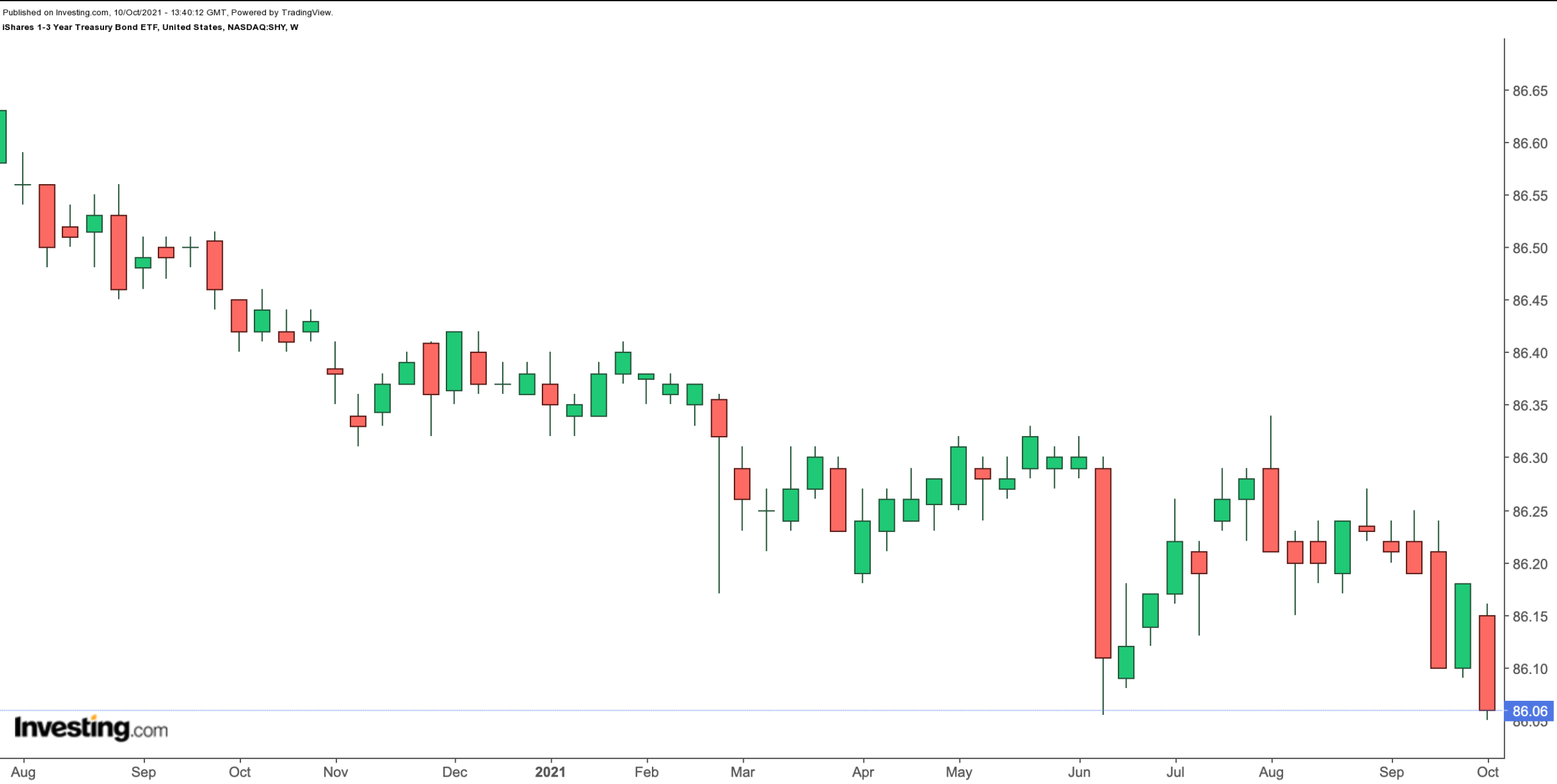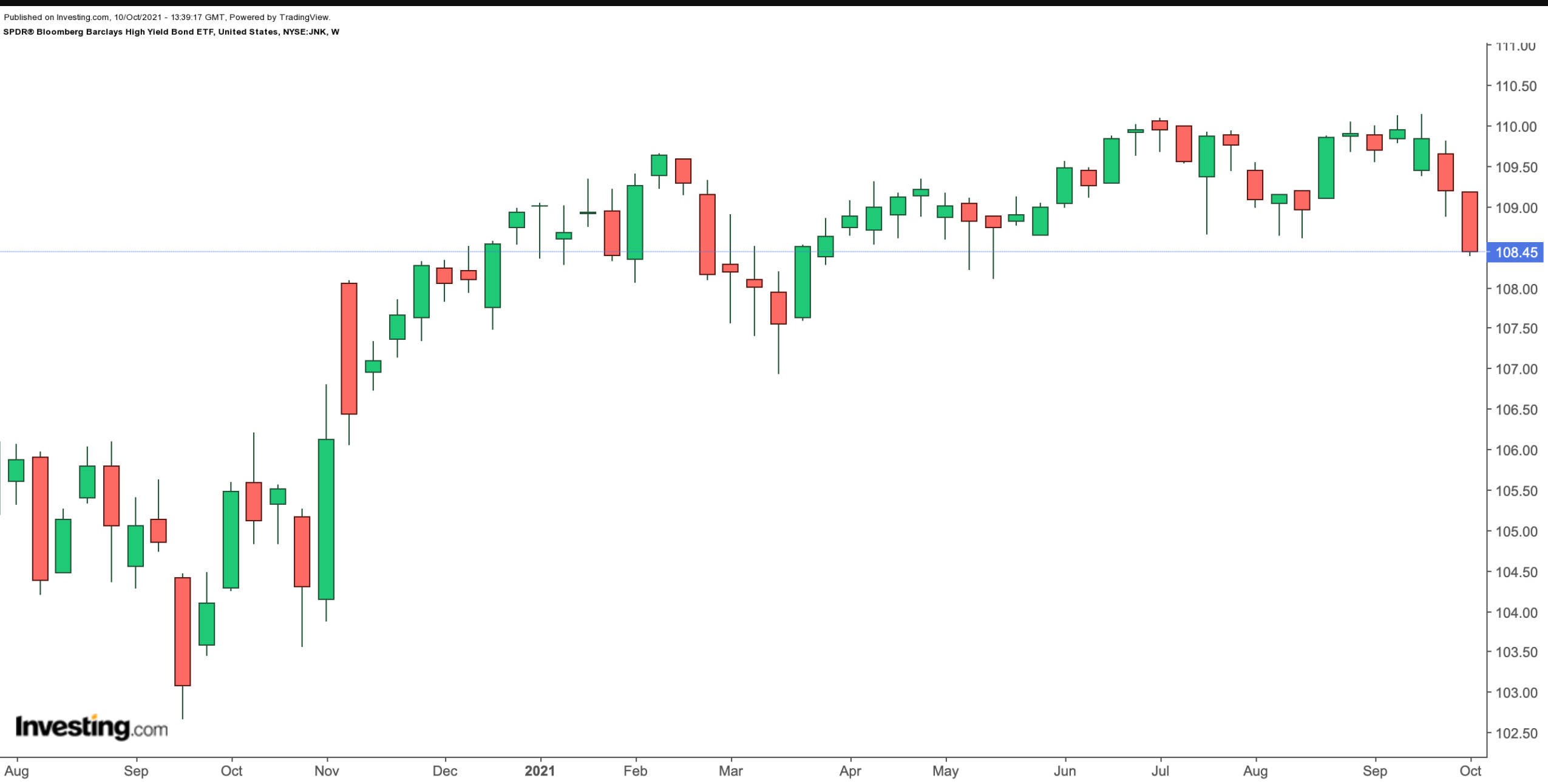Blustery fall weather usually corresponds with seasonal choppiness in stocks, and so far 2021 is proving to be no exception. When volatility in equity markets goes up, bonds as well as bond exchange-traded funds (ETFs) get increased attention.
A bond ETF might hold different fixed-income securities, such as Treasuries, sovereign bonds, municipal bonds, corporate bonds, or high-yield “junk” bonds. There are also ETFs that bring together different asset classes, including bonds, equities, real estate investment trust (REITs), and commodities.
Currently, the US 10-year Treasury yield—which moves inversely to prices—is sitting above 1.6%. In mid-August, it was shy of 1.2%. Rising yields typically unsettle Wall Street.
When yields increase fast, investors reevaluate how they allocate their capital among different asset classes. For instance, some might wonder if they might have become complacent with their stock positions.
Market participants are now closely watching increasing inflation levels, the possibility that the Federal Reserve might reduce its monthly bond purchases, and lately also concerns over the federal debt ceiling. And a number of investors are likely wondering where they could possible “park their cash.”
Meanwhile, analysts are debating what could be next for yields. Those investors who believe an increase toward the 1.75% or even 2.0% level in the coming quarters would need to pay attention to the duration of a bond (or bond ETF).
Duration suggests how much the price a bond will change when interest rates move. For instance, if a bond ETF has a duration of three years, its price would decline by about 3% if interest rates increase by one percentage point. Put another way, the higher the duration, the greater the sensitivity of the value of a bond portfolio to changes in interest rates.
Regular readers of this column know that we cover bond funds regularly (for example, discussed here, here, here, here, here, here and here). With that information, here are two more ETFs that could act as store of value in the weeks ahead.
1. iShares 1-3 Year Treasury Bond ETF
- Current Price: $86.06
- 52-Week Range: $86.05 - $86.46
- Yield To Maturity: 0.32%
- Expense Ratio: 0.15% per year
The iShares 1-3 Year Treasury Bond ETF (NASDAQ:SHY) invests in short-term US Treasury bonds whose maturities range from one to three years. In other words, investors do not need to worry about credit risk. Since its inception in July 2002, net assets have reached $20.25 billion.

SHY, which currently has 74 holdings, tracks the performance of the ICE US Treasury 1-3 Year Index.
The bond ETF has an average duration of 1.91 years. Put another way, the price would decline close to 2% when interest rates rise one percentage point.
So far in the year, the fund is down 0.37%, and hit a 52-week low on Oct. 8. Readers might be interested to know that the 52-week high was seen on Oct. 15, 2020. Those investors who need to park cash in the coming weeks might want to research SHY further.
SPDR® Bloomberg Barclays High Yield Bond ETF
- Current Price: $108.45
- 52-Week Range: $103.56 - $110.14
- Yield To Maturity: 4.86%
- Expense Ratio: 0.4% per year
The SPDR® Bloomberg Barclays High Yield Bond ETF (NYSE:JNK) gives exposure to US dollar-denominated high yield (i.e., junk) corporate bonds with above-average liquidity. Therefore, the ETF may not be appropriate for investors who are very risk-averse.
Seasoned investors may remember the fund as one of the bond ETFs that had significant losses in 2008 in the early part of the global financial crisis. Then, JNK had massive run up in price during the recovery that started in 2009.

JNK, which has 1,323 holdings, tracks the returns of the Bloomberg Barclays High Yield Very Liquid Index. The fund started trading in November 2007, and has around $8.51 billion in assets. In 2020, JNK was one of the bond ETFs the Fed had bought.
In terms of the sub-sectoral breakdown, the Consumer Cyclical sector makes up the highest slice with 20.77%. Next in line are Communication (16.39%), Consumer Non-Cyclicals (14.69%) and Energy (12.72%), respectively.
The top 10 holdings account for about 3.3% of the fund. About half of the bonds are BB rated, followed by B- (37.90%) and CCC or lower (12.15%).
Among the leadings names are bonds of TransDigm (NYSE:TDG), which manufactures aircraft components; American Airlines (NASDAQ:AAL); healthcare group Centene (NYSE:CNC); gaming and hospitality heavyweight Caesars (NASDAQ:CZR); and cruise group Carnival Corporation (NYSE:CCL).
Over the past year, the fund is up close to 3%, and saw a 52-week high in late September. JNK might be appropriate especially for some readers in search of yield.
